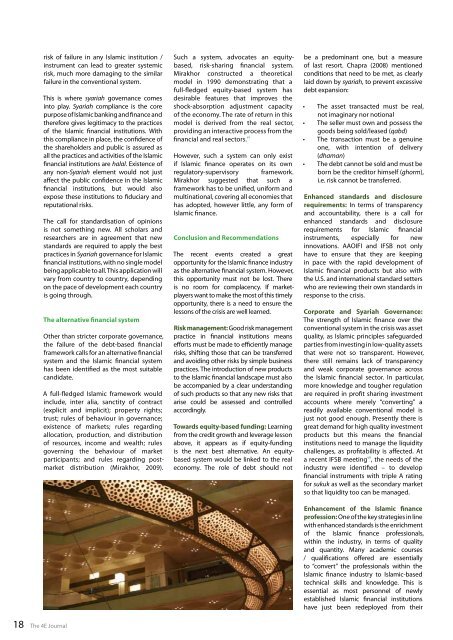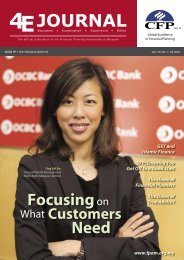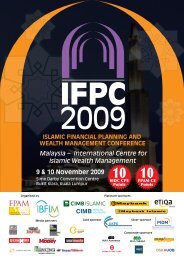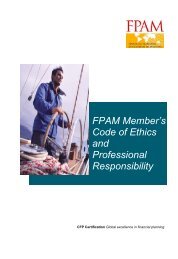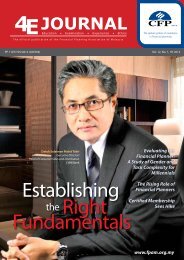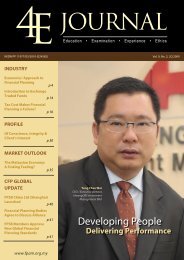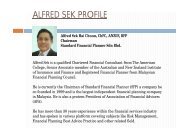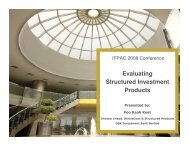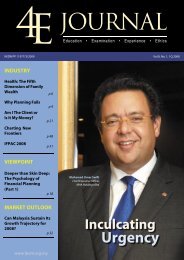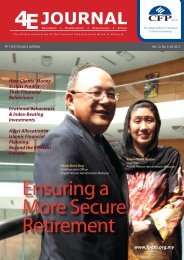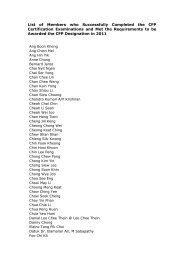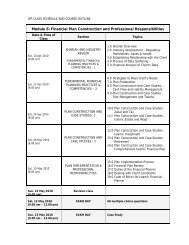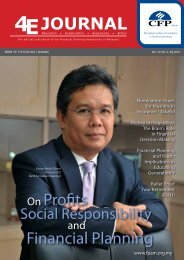Vol 10, No 4 - Financial Planning Association of Malaysia
Vol 10, No 4 - Financial Planning Association of Malaysia
Vol 10, No 4 - Financial Planning Association of Malaysia
You also want an ePaper? Increase the reach of your titles
YUMPU automatically turns print PDFs into web optimized ePapers that Google loves.
isk <strong>of</strong> failure in any Islamic institution /<br />
instrument can lead to greater systemic<br />
risk, much more damaging to the similar<br />
failure in the conventional system.<br />
This is where syariah governance comes<br />
into play. Syariah compliance is the core<br />
purpose <strong>of</strong> Islamic banking and finance and<br />
therefore gives legitimacy to the practices<br />
<strong>of</strong> the Islamic financial institutions. With<br />
this compliance in place, the confidence <strong>of</strong><br />
the shareholders and public is assured as<br />
all the practices and activities <strong>of</strong> the Islamic<br />
financial institutions are halal. Existence <strong>of</strong><br />
any non-Syariah element would not just<br />
affect the public confidence in the Islamic<br />
financial institutions, but would also<br />
expose these institutions to fiduciary and<br />
reputational risks.<br />
The call for standardisation <strong>of</strong> opinions<br />
is not something new. All scholars and<br />
researchers are in agreement that new<br />
standards are required to apply the best<br />
practices in Syariah governance for Islamic<br />
financial institutions, with no single model<br />
being applicable to all. This application will<br />
vary from country to country, depending<br />
on the pace <strong>of</strong> development each country<br />
is going through.<br />
The alternative financial system<br />
Other than stricter corporate governance,<br />
the failure <strong>of</strong> the debt-based financial<br />
framework calls for an alternative financial<br />
system and the Islamic financial system<br />
has been identified as the most suitable<br />
candidate.<br />
A full-fledged Islamic framework would<br />
include, inter alia, sanctity <strong>of</strong> contract<br />
(explicit and implicit); property rights;<br />
trust; rules <strong>of</strong> behaviour in governance;<br />
existence <strong>of</strong> markets; rules regarding<br />
allocation, production, and distribution<br />
<strong>of</strong> resources, income and wealth; rules<br />
governing the behaviour <strong>of</strong> market<br />
participants; and rules regarding postmarket<br />
distribution (Mirakhor, 2009).<br />
Such a system, advocates an equitybased,<br />
risk-sharing financial system.<br />
Mirakhor constructed a theoretical<br />
model in 1990 demonstrating that a<br />
full-fledged equity-based system has<br />
desirable features that improves the<br />
shock-absorption adjustment capacity<br />
<strong>of</strong> the economy. The rate <strong>of</strong> return in this<br />
model is derived from the real sector,<br />
providing an interactive process from the<br />
financial and real sectors. vi<br />
However, such a system can only exist<br />
if Islamic finance operates on its own<br />
regulatory-supervisory framework.<br />
Mirakhor suggested that such a<br />
framework has to be unified, uniform and<br />
multinational, covering all economies that<br />
has adopted, however little, any form <strong>of</strong><br />
Islamic finance.<br />
Conclusion and Recommendations<br />
The recent events created a great<br />
opportunity for the Islamic finance industry<br />
as the alternative financial system. However,<br />
this opportunity must not be lost. There<br />
is no room for complacency. If marketplayers<br />
want to make the most <strong>of</strong> this timely<br />
opportunity, there is a need to ensure the<br />
lessons <strong>of</strong> the crisis are well learned.<br />
Risk management: Good risk management<br />
practice in financial institutions means<br />
efforts must be made to efficiently manage<br />
risks, shifting those that can be transferred<br />
and avoiding other risks by simple business<br />
practices. The introduction <strong>of</strong> new products<br />
to the Islamic financial landscape must also<br />
be accompanied by a clear understanding<br />
<strong>of</strong> such products so that any new risks that<br />
arise could be assessed and controlled<br />
accordingly.<br />
Towards equity-based funding: Learning<br />
from the credit growth and leverage lesson<br />
above, it appears as if equity-funding<br />
is the next best alternative. An equitybased<br />
system would be linked to the real<br />
economy. The role <strong>of</strong> debt should not<br />
be a predominant one, but a measure<br />
<strong>of</strong> last resort. Chapra (2008) mentioned<br />
conditions that need to be met, as clearly<br />
laid down by syariah, to prevent excessive<br />
debt expansion:<br />
• The asset transacted must be real,<br />
not imaginary nor notional<br />
• The seller must own and possess the<br />
goods being sold/leased (qabd)<br />
• The transaction must be a genuine<br />
one, with intention <strong>of</strong> delivery<br />
(dhaman)<br />
• The debt cannot be sold and must be<br />
born be the creditor himself (ghorm),<br />
i.e. risk cannot be transferred.<br />
Enhanced standards and disclosure<br />
requirements: In terms <strong>of</strong> transparency<br />
and accountability, there is a call for<br />
enhanced standards and disclosure<br />
requirements for Islamic financial<br />
instruments, especially for new<br />
innovations. AAOIFI and IFSB not only<br />
have to ensure that they are keeping<br />
in pace with the rapid development <strong>of</strong><br />
Islamic financial products but also with<br />
the U.S. and international standard setters<br />
who are reviewing their own standards in<br />
response to the crisis.<br />
Corporate and Syariah Governance:<br />
The strength <strong>of</strong> Islamic finance over the<br />
conventional system in the crisis was asset<br />
quality, as Islamic principles safeguarded<br />
parties from investing in low-quality assets<br />
that were not so transparent. However,<br />
there still remains lack <strong>of</strong> transparency<br />
and weak corporate governance across<br />
the Islamic financial sector. In particular,<br />
more knowledge and tougher regulation<br />
are required in pr<strong>of</strong>it sharing investment<br />
accounts where merely “converting” a<br />
readily available conventional model is<br />
just not good enough. Presently there is<br />
great demand for high quality investment<br />
products but this means the financial<br />
institutions need to manage the liquidity<br />
challenges, as pr<strong>of</strong>itability is affected. At<br />
a recent IFSB meeting vii , the needs <strong>of</strong> the<br />
industry were identified – to develop<br />
financial instruments with triple A rating<br />
for sukuk as well as the secondary market<br />
so that liquidity too can be managed.<br />
Enhancement <strong>of</strong> the Islamic finance<br />
pr<strong>of</strong>ession: One <strong>of</strong> the key strategies in line<br />
with enhanced standards is the enrichment<br />
<strong>of</strong> the Islamic finance pr<strong>of</strong>essionals,<br />
within the industry, in terms <strong>of</strong> quality<br />
and quantity. Many academic courses<br />
/ qualifications <strong>of</strong>fered are essentially<br />
to “convert” the pr<strong>of</strong>essionals within the<br />
Islamic finance industry to Islamic-based<br />
technical skills and knowledge. This is<br />
essential as most personnel <strong>of</strong> newly<br />
established Islamic financial institutions<br />
have just been redeployed from their<br />
18 The 4E Journal


